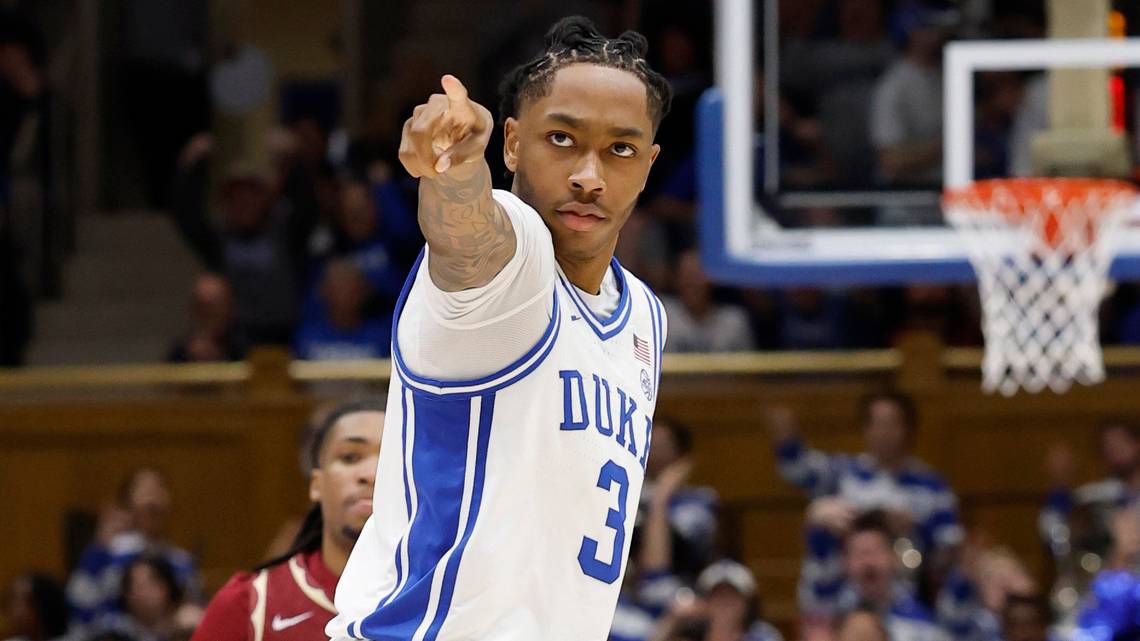Duke basketball got the answer it was waiting for, and it’s one that could shape the program’s offense for the 2025-26 season and beyond. Highly touted 3-point specialist Isaiah Evans has decided to return to Durham for his sophomore campaign, ending weeks of speculation about whether he would test the NBA Draft waters or enter the transfer portal amid the ever-changing landscape of college basketball. Instead, Evans is running it back — and in doing so, he’s positioning himself as one of the most dangerous perimeter threats in the country.
For a Duke program that prides itself on developing talent while competing for national championships, Evans’ decision is a significant boost. While all eyes were naturally on Cooper Flagg and the incoming freshman class, the Blue Devils were also closely watching the evolution of players like Evans, who had the kind of freshman year that offered flashes of elite potential. His return gives Duke a proven long-range scorer with another year of experience, one who can space the floor, create gravity for his teammates, and score in bunches when he heats up.
Evans, a former five-star recruit from North Carolina, came to Duke with a reputation for scoring and lived up to it in spurts during his first year. While his role fluctuated early in the season as head coach Jon Scheyer experimented with rotations, Evans eventually found his footing, becoming a key contributor during the ACC slate and into March. He averaged 10.4 points per game while shooting 41.6% from beyond the arc — a mark that led all ACC freshmen and ranked among the best in the nation for players under 20.
But it wasn’t just the numbers that made Evans’ freshman season promising. It was the way he scored. Whether curling off screens for catch-and-shoot looks, pulling up in transition, or using his length and quick release to fire over smaller defenders, Evans displayed the kind of versatile shooting ability that makes NBA scouts pay attention. He hit at least four 3-pointers in nine different games, and when he got hot, he changed the entire complexion of Duke’s offense.
There were growing pains, of course. As with most first-year players, consistency was a challenge. Evans had stretches where his shot wasn’t falling, and his defensive awareness occasionally lagged behind the speed of the college game. But what impressed Scheyer and the coaching staff was his work ethic, coachability, and willingness to grow through those struggles. Evans embraced the film room, spent extra hours in the gym, and bought into Duke’s defensive system, knowing that it would earn him more minutes and trust on the floor.
With a year under his belt, Evans is poised to take the next step. He’s not just returning as a shooter — he’s returning as a leader. In interviews throughout the offseason, Evans made it clear that he views this next season as a chance to win a national championship and elevate his NBA stock in the process. While he received interest from multiple NBA teams gauging his readiness, feedback from scouts suggested that one more year in college, especially with an expanded role, could boost his draft position into the first round.
That’s something both he and Duke are betting on. With Jeremy Roach departing and a new group of freshmen set to arrive, Evans will likely move into a larger offensive role. He’s expected to start at shooting guard, where his ability to stretch defenses will be critical to opening up driving lanes for Flagg and fellow returnees like Tyrese Proctor. The spacing Evans provides can’t be overstated — when he’s on the court, defenders can’t sag off him, which creates opportunities for everyone else to operate.
There’s also the chemistry factor. Evans’ return maintains continuity in a program that’s constantly adjusting to high roster turnover due to NBA departures and transfers. Having a known commodity like Evans back, someone who understands the system and expectations, offers Scheyer a foundational piece around which he can build lineups. And in a college basketball world where elite shooting is at a premium, Evans gives Duke a weapon that few teams can match.
The timing of his announcement was also important. By clarifying his intentions early in the offseason, Evans allowed Duke to finalize its roster construction without having to scramble for late additions. The Blue Devils are already bringing in a top-ranked recruiting class headlined by Khaman Maluach, a 7-footer from South Sudan, and combo guard Dylan Harper, both of whom will benefit from Evans’ perimeter gravity.
Scheyer, entering his third full season as Duke’s head coach, has consistently emphasized the importance of blending young talent with veteran leadership. Last year’s group showed signs of brilliance but ultimately fell short in March due to inexperience and inconsistent shot-making. With Evans returning, that shooting concern is addressed in a big way. He’s the kind of player who can win games with his hot hand — and lose defenders in an instant with his off-ball movement.
Evans’ offseason plans are already underway. He’s reportedly added seven pounds of muscle since the end of the season and is working with Duke’s strength and conditioning staff to improve his lateral quickness and stamina. On the court, he’s focusing on expanding his offensive arsenal — improving his ability to attack closeouts, make plays off the bounce, and finish through contact. If he can evolve from a specialist into a more complete scorer, he’ll be a matchup nightmare.
There’s also a growing sense that Evans is becoming one of the emotional leaders of the locker room. Known for his laid-back demeanor as a freshman, he’s become more vocal in practices and workouts, setting the tone for younger players. That maturity, combined with his elite skill set, makes him one of the most important returnees in college basketball — even if he isn’t always the first name mentioned in preseason projections.
Evans’ return also sends a message about Duke’s culture under Scheyer. While NIL opportunities and NBA aspirations continue to reshape the college basketball landscape, Duke has remained a place where top talent can develop, compete at the highest level, and still find reasons to stay another year. The program’s ability to retain key players like Evans, Proctor, and even big man Sean Stewart speaks volumes about the buy-in the staff has cultivated.
That buy-in could be the difference in a season loaded with expectation. With Flagg generating Wooden Award buzz and Harper adding explosiveness in the backcourt, Duke has the tools to be a national title contender. But in March, games are often decided by who can make shots under pressure. In Evans, Duke has a guy who doesn’t just make those shots — he lives for them. He’s the kind of player who can erupt in a Sweet 16 game and shift momentum in a heartbeat.
As Duke continues its offseason preparation, fans and analysts alike are circling Isaiah Evans as a player to watch. His return might not have come with the same fanfare as Flagg’s arrival or Proctor’s decision to come back, but it might prove to be just as impactful. He gives Duke shooting, leadership, and swagger — a combination that’s hard to quantify but essential to winning big.
In a sport where rosters are constantly in flux, and the spotlight often shifts from one star to the next, Evans’ loyalty and long-term view are refreshing. He knows the NBA will be there. But for now, he wants to win at Duke, wear the blue and white with pride, and leave his mark on Cameron Indoor Stadium in a way that only a select few have.
He’s not done yet. And Duke is better because of it.



